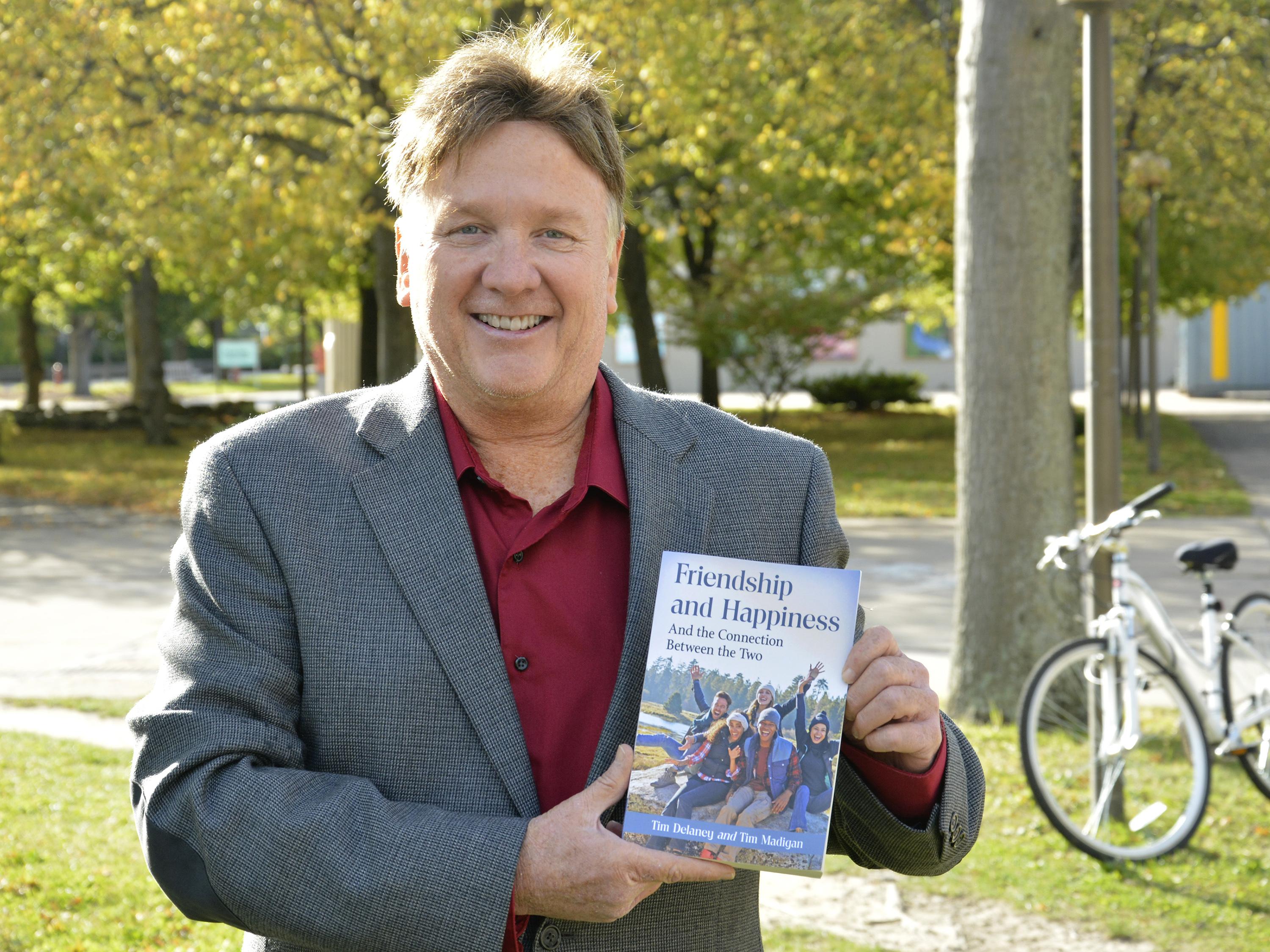Finding happiness -- SUNY Oswego sociology professor Tim Delaney examines “Friendship and Happiness: The Connection Between the Two” in his latest book co-authored by Tim Madigan of St. John Fisher College.
From the theories of Aristotle to relationships on Facebook, the latest co-authored book by SUNY Oswego sociology professor Tim Delaney examines "Friendship and Happiness: The Connection Between the Two."
Delaney's frequent co-author, St. John Fisher College philosophy professor Tim Madigan, first proposed the idea of a book based on Aristotle’s three types of friendships and carrying principles forward to the electronic age.
As a result, the book starts rooted in Aristotle's categories: friendships of utility ("certain people you’re friends with because they can help you, and vice versa"), friendships of pleasure ("people you associate with because they are fun and you do things together") and friendships of the good ("the highest order: the friends who are with you for good times and bad times"), Delaney explained.
The book examines a number of theories and transposes these ideals into the modern realm, looking at such relationships as best friends, close friends, casual friends, work friends, ex-friends and friends of friends.
Delaney particularly notes how electronic friendships have developed as an increasingly large part of people's social circles.
"Many of us have friends on social media we've never met face to face, but you see their posts and interact and feel like you really know them," he said. "We have slowly been socialized into this cyber world to find it the norm, so it's not surprising we treat cyber relationships as real."
The authors ponder the question: Is a Facebook friend a "real" friend?
"Electronic friends are as real as we make them," Delaney said. "If it has meaning to you and to the person you're connected to, then these are real friendships, real relationships."
Introducing happiness
The book's exploration of happiness "just seemed like a natural progression," Delaney said. "Most of us can recognize that if you have good friends, you're more likely to be happy."
Thus "Friendship and Happiness" examines the same question so many self-help books do – "What's the secret to happiness?" -- albeit from a philosophical and sociological standpoint.
"The first thing you have to do to be happy is to not be unhappy," Delaney said. "It sounds simple, but all the self-help books can't make anybody happy if they're unhappy. They have to eliminate the sources of their unhappiness first." The book explores these sources and what people can do about them.
They cite studies finding happiness has many corresponding benefits: Happiness is good for one's health, relationships, productivity and prosperity at work, generosity, resilience and creativity; happy people also have better attitudes toward academic attainment, satisfaction, altruism and self-esteem.
The interdisciplinary partnership meant they were able to combine philosophical concepts like ethics with sociological topics like morality, socialization and group behavior. They draw upon British philosopher Bertrand Russell’s noteworthy 1930 book, "The Conquest of Happiness," as well as many different theories and ways people find happiness. Delaney said sociology complements these concepts because it can explain how groups form and how friendships develop from that.
To help inform the book's viewpoints, Delaney and Madigan surveyed students from their respective institutions on such topics as what qualities make a good friend, their views on electronic friendship and how many good friends they have.
As in many of his books, Delaney said examples from popular culture help illustrate points, incorporating everything from "Seinfeld" to MTV's "Catfish," "It's a Wonderful Life" to "When Harry Met Sally."
Ultimately, he said, the book can find use in philosophy or sociology classes, but can be enjoyed by anybody wanting to know more about friendship or happiness.
"Overall, it's a feel-good theme and we keep it a positive theme," Delaney said.
The duo also plans to edit a forthcoming volume, "Friendship and Happiness: A Global Perspective," featuring papers from The Pandisciplinary Global Conference on Happiness and Friendship, which they attended at Mount Melleray Abbey in Waterford, Ireland, in June.
The authors will have a book signing from 5 to 7 p.m. on Saturday, Nov. 4, at Swaby’s Tavern, 6 South St. in Auburn, Delaney’s hometown.




